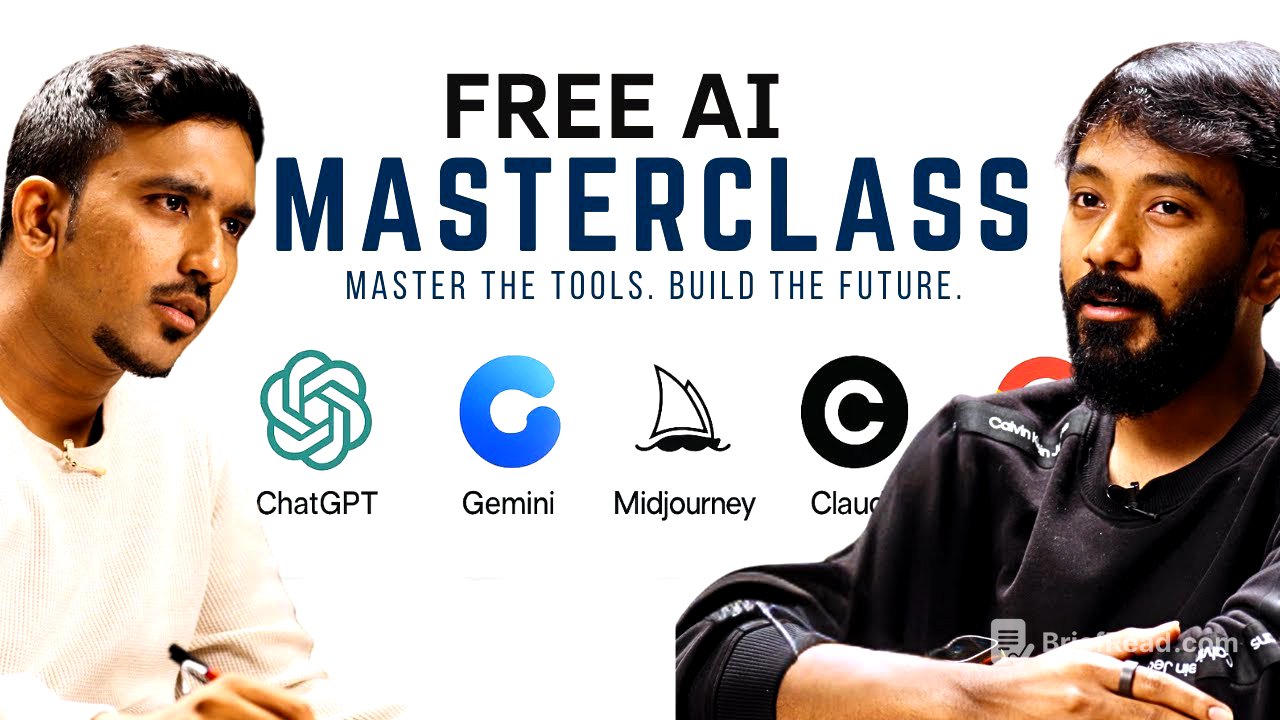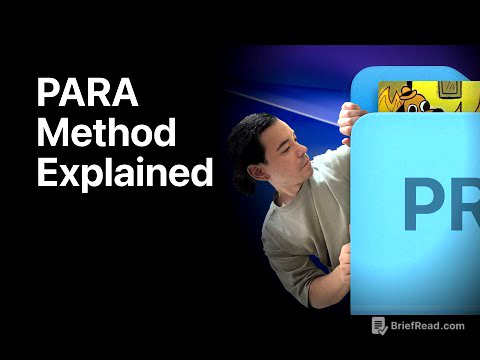TLDR;
This video discusses the impact of AI agents on the workforce and provides a framework for working professionals and founders to adapt and thrive in the age of AI. It covers AI generalists, AI toolkit, AI models, prompting techniques, and automation. The conversation highlights the importance of curiosity, continuous learning, and practical application of AI tools to enhance efficiency and problem-solving skills.
- AI agents are entering the workforce and can replace human tasks.
- Working professionals should become AI generalists to solve problems using AI.
- A framework is provided to understand AI models and prompting techniques.
- Automation and building AI agents can lead to full-fledged solutions.
- There is a huge scope for AI agencies to help companies implement AI solutions.
Trailer [0:00]
The trailer features Sam Altman discussing the entry of AI agents into the workforce, emphasizing their potential impact by 2025. The speaker highlights the importance of India becoming a leader in the AI revolution. He shares his experience of raising $5 million without coding knowledge, underscoring the accessibility of AI for product development.
Introduction [4:17]
The host, Ganesh Prasad, introduces Weber, highlighting his expertise in education and technology, particularly AI. Ganesh confesses his own AI illiteracy and acknowledges the life-changing insights Weber has provided. The discussion aims to explore how AI applies to working professionals amidst the US recession and its potential impact on the Indian tech industry.
What should working professionals do amidst this AI race? [5:54]
The discussion addresses the impact of a potential recession on consumer spending and company investments in employees, leading to layoffs. The rise of AI agents presents an opportunity for companies to replace human workers with more efficient technology. Companies like Google are already reducing middle management roles to cut costs and adopt AI processes.
What are AI agents? [7:01]
AI agents can complete full tasks, unlike AI assistants that only answer questions. For example, an AI agent can research 5,000 Y Combinator companies, analyze their websites, and compile a list of potential business ideas for India in a Google Sheet. This task, which would take a human 10 days, can be done overnight by an AI agent. Tools like Deep Research can read hundreds of articles and provide a report in about an hour, a task that would take weeks for a person.
US doesn’t want China and India to win the AI race [14:05]
Donald Trump is limiting GPU sales to countries like China and India to prevent them from building AI capabilities that rival the US. GPUs are essential for training AI models. The US aims to control AI technology to maintain its manufacturing power and reduce reliance on countries with cheaper labor. Autonomous factories powered by AI could shift manufacturing back to the US.
Writing Code with AI [21:31]
Tools like Cursor, Windsurf, and Bolt are AI agents specialized in writing code. OpenAI's new model 03 can write code at the level of a top 200 developer. In Growth School, 65% of the code is written by AI using a 2-year-old model. It's predicted that within 6 months to a year, almost all code will be written by AI. The future programming language is English, emphasizing the importance of prompting.
Level 0 AI [26:58]
Level zero involves defining your perfect AI toolkit by identifying tasks that AI can improve. It includes exploring various tools and sticking with those that work best for you. A great place to find tools is "There is an AI for that.com" and Product Hunt to identify if the tool is good or not. Examples of tools include Numerous for Excel, Gamma for presentations, and Google Deep Research for research.
AI tools comparison [31:40]
There is no single "best" AI tool; the quality of the output depends on the quality of the prompt. Claude is excellent for writing style, while Google Deep Research is better for in-depth research due to its extensive access to internet resources. Grock, built by Elon Musk, has access to Twitter data, providing unique insights and perspectives.
Level 1 AI [37:25]
Level one involves understanding AI models, including reasoning and non-reasoning models, open-source models, and how they work. This understanding helps in problem-solving. For example, when preparing for an investor meeting, using GPT 4.5 to understand investor values and potential questions. For term sheet analysis, reasoning models like 03 or Gemini deep thinking model are more suitable than GPT 4.5.
Framework to understand which AI models to use [49:58]
The only way to understand which model is better for what is by trying and testing things out. GPT5 is expected to integrate all models, removing the guesswork of which model to use. In the meantime, curiosity and exploration are essential.
Level 2 AI [54:10]
Level two focuses on advanced prompting techniques. The magic prompt formula includes role, objective, context, instructions, and notes. The role specifies the AI's expertise, the objective defines the task, the context explains the importance, and instructions provide specific details. Notes are used for additional feedback or information.
Level 3 AI [1:01:53]
Level three involves understanding images, videos, and audio, known as diffusion. This knowledge is essential for problem-solving in various forms. Tools to explore include 11 Labs, Midjourney, Leonardo AI, Stable Diffusion, ComfyUI, RunwayML, LumaLabs, Sora, and VEO.
Level 4 AI [1:10:42]
Level four involves automating tasks and building AI agents to solve problems. A great start is automating email replies using tools like Make.com or Zapier, which integrate with Gmail and OpenAI. Conditional logics can be added to handle different types of emails.
Automating emails with AI [1:12:20]
To automate email replies, use Zapier to connect Gmail and OpenAI. Create a prompt that defines the AI's role as an executive assistant, its objective to write replies, and the context of your brand. Add conditional logic to categorize emails and send appropriate responses or forward them to relevant teams.
Service as a Software [1:20:40]
The rise of AI consultants and agencies presents a huge opportunity. These agencies can transition into service as a software companies, where software replaces 95% of human tasks but still includes a human in the loop. This model differs from software as a service (SaaS), where software provides a pure solution without human intervention.
Level 5 AI [1:25:20]
Level five involves building full-fledged solutions to solve your own or your company's problems. For example, automating the content creation process by building a platform that integrates deep research, writing tools, and human input. This replaces the toolkit used at level zero with specialized tools.
Scope for AI Agencies [1:29:30]
There is a huge scope for AI agencies to help companies implement AI solutions. Large companies have Accenture and Vipro, but smaller companies need specialized solutions. The lack of supply is due to most people being stuck at level zero, thinking AI is just about ChatGPT.
Call to action for founders [1:33:12]
Entrepreneurs should re-evaluate all workflows and embrace AI to become super employees. Regardless of the company's status, AI generalists will be in demand. Building context and keeping up with new developments are essential. The best and worst thing happening today is AI, and we must find the right balance to leverage it.









